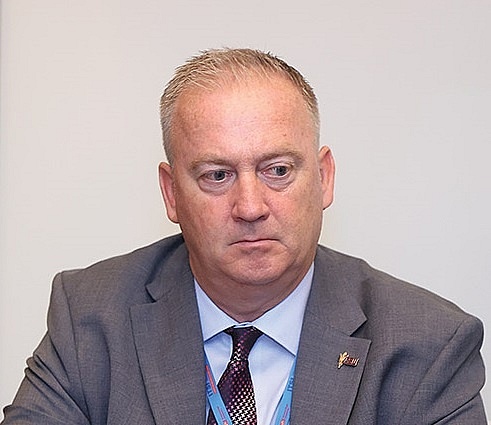Fund set to yield big microchip benefits for Vietnam and US
Vietnam is simultaneously implementing many solutions to increase its role in the global supply chain, some of these come from the enthusiastic support of the US government over the past year. Could you offer an overview of the Vietnam-US cooperation strategy and what lies ahead?
 |
| Marc E. Knapper, US Ambassador to Vietnam |
The results and synchronous efforts of the entire political system, businesses, and educational and training institutions in Vietnam are contributing significantly to the development of the semiconductor ecosystem in Vietnam.
The semiconductor ecosystem is not only the physical facilities for assembly, testing, and packaging (ATP) or semiconductor manufacturing facilities. We see the importance and movements of US investors, but infrastructure and the supply of essential utilities also play a critical role in the ecosystem operation.
We highly appreciate the northern province of Bac Ninh’s government’s commitment to a very stable power supply for the production and business activities of enterprises.
In recent months, we have received very new announcements from the Ministry of Industry and Trade about the direct power purchase agreements that current or upcoming investors can sign them with renewable energy producers. This mechanism is the outcome of seven years of working between the Vietnamese and the US governments to build it, ensuring efficiency and safety for both the Vietnamese government and investors operating in the country.
Besides that, the International Technology Security and Innovation (ITSI) fund is also one of the efforts to raise semiconductor human resources for Vietnam. However, we need to do many things to develop the semiconductor industry and its system, as well as increasingly increase the attractiveness and receive more investors in this field.
The initial results seem to be good, including the cooperation between Vietnamese and US universities specialising in high technologies to train semiconductor engineers, and other bilateral cooperation programmes.
There are some good signals from US partners and businesses for Vietnam, specifically two visits by the US semiconductor industry associations and the visit of Apple and Nvidia CEOs. This reflects the atmosphere of great expectation and excitement for investment in Vietnam. The cooperation programmes on semiconductors between the two countries have been strong in the past year, but this is just the beginning, and I believe in upcoming activities and plans.
Vietnam is one of eight countries in the ITSI fund, so what is Vietnam’s position in this alliance, and what does the US expect for Vietnam in semiconductor ATP after launching it?
Over the years, this partnership has laid a strong foundation for deeper collaboration across many areas of our bilateral relationship, including one of the most critical industries in semiconductors.
The United States is proud to invest in Vietnam’s future through workforce development programmes that create lasting partnerships and ensure Vietnam’s professionals are equipped with the skills and knowledge needed to excel in this rapidly evolving sector. Together, we are building institutional ties that will shape the semiconductor industry here in Vietnam for many years to come.
This programme will be instrumental in developing a curriculum designed specifically to equip Vietnamese professionals with the tools necessary to succeed in the fast-paced world of semiconductors. But our collaboration goes beyond training and education. We are working closely with Vietnam to lay the groundwork for a broader semiconductor ecosystem. This includes deepening Vietnam’s connections to global supply chains, thereby paving the way for sustainable economic growth and technological advancement.
I am confident that our joint efforts will yield significant benefits for both countries. The US government is making an additional $5 million available to support further semiconductor-related activities in Vietnam.
During cooperation and support for semiconductor workforce development, what is most necessary for Vietnamese enterprises to participate more deeply in the semiconductor supply chain?
In addition to technical training, there is also a need to enable English to be the second official language in Vietnam to be more widely taught in Vietnam.
I expect that high school or university and college training programmes in Vietnam, especially in chip design, manufacturing, semiconductor equipment, IT, and computer science, will be taught in English.
Thereby, graduates can communicate directly with US partners in English early, which will open up many business and job opportunities for Vietnamese enterprises and individuals.
| Jeffrey Goss, principal ITSI investigator Arizona State University
In the semiconductor industry, the ability to speak and work in English is essential because many technical concepts are used in English, and computer language is English. Therefore, with cooperation via the ITSI fund, we have a specialised English training course for semiconductors. This collaboration opens up tremendous opportunities for Vietnamese students and professionals to gain cutting-edge skills in semiconductor technology. We are honoured to support Vietnam’s journey towards becoming a key player in this transformative industry. Some investment activities are taking place or are soon plans of investors. Amkor pours billions of US dollars in ATP in Vietnam, in addition to investments by Hana Micron and Felix, and Intel. TSMC makes a direct investment abroad that can be considered the largest amount ever of the company, to build manufacturing plants in Vietnam. Thus, Vietnam has an extremely favourable advantage in capturing this dynamic investment activity. However, Vietnam also needs to improve its readiness and ensure essential conditions for businesses to set up production and business facilities, especially electricity and green energy supply play a critical role. Each incident or delay costs a lot of money. Virginia Kent, senior ITSI coordinator Bureau of Economic and Business Affairs
Vietnam is one of eight countries selected for this initiative, along with Costa Rica, Mexico, Panama, Indonesia, the Philippines, Kenya, and India, all supported by the US Department of State’s Bureau of Economic and Business Affairs. Vietnam is one of the most important and strategic partners of the US government. We see many opportunities for investment and business in Vietnam, particularly in ATP semiconductors. We have coordinated with the Vietnamese government to expand and strengthen investment and cooperation activities effectively. This partnership extends beyond technological advancements. It represents a shared commitment to fostering sustainable development and prosperity through innovation. Together, we can ensure that the benefits of technological progress are widely distributed, strengthening our economies and our shared democratic values. Vietnamese partners have been coordinating in reviewing the ATP ecosystem within the Organisation for Economic Co-operation and Development framework. The draft will be completed soon and we will announce the outcomes, which are essential in developing the semiconductor ecosystem, covering all relevant areas such as infrastructure, policy mechanisms, legal regulations on human resource development, and skills improvement. This will be useful to enhance the position of countries participating in this framework in the global semiconductor supply chain. This report will also provide input for Arizona State University’s human resource development programme, in collaboration with more than 20 educational institutions across Vietnam, to train hundreds of lecturers and professors for pioneering human resource lecturers of the semiconductor industry. |
| Wide-ranging partnerships pick up semiconductor pace The collaboration between the state, enterprises, and universities is proving effective in developing human resources for the semiconductor industry and achieving the goals set for 2030. |
| US shows support for Vietnam's semiconductor industry The United States and Vietnam marked the first anniversary of its Comprehensive Strategic Partnership by launching workshops on semiconductor workforce development and public policy workshops. |
| Amkor Technology in negotiation to export semiconductor products Amkor Technology, which operates a mega factory for semiconductor assembly and testing in the northern province of Bac Ninh, is in negotiation with an additional six partners to export semiconductor products. |
What the stars mean:
★ Poor ★ ★ Promising ★★★ Good ★★★★ Very good ★★★★★ Exceptional
Related Contents
Latest News
More News
- SK Innovation-led consortium wins $2.3 billion LNG project in Nghe An (February 25, 2026 | 07:56)
- THACO opens $70 million manufacturing complex in Danang (February 25, 2026 | 07:54)
- Phu Quoc International Airport expansion approved to meet rising demand (February 24, 2026 | 10:00)
- Bac Giang International Logistics Centre faces land clearance barrier (February 24, 2026 | 08:00)
- Bright prospects abound in European investment (February 19, 2026 | 20:27)
- Internal strengths attest to commitment to progress (February 19, 2026 | 20:13)
- Vietnam, New Zealand seek level-up in ties (February 19, 2026 | 18:06)
- Untapped potential in relations with Indonesia (February 19, 2026 | 17:56)
- German strengths match Vietnamese aspirations (February 19, 2026 | 17:40)
- Kim Long Motor and AOJ Suzhou enter strategic partnership (February 16, 2026 | 13:27)



 Tag:
Tag:




















 Mobile Version
Mobile Version